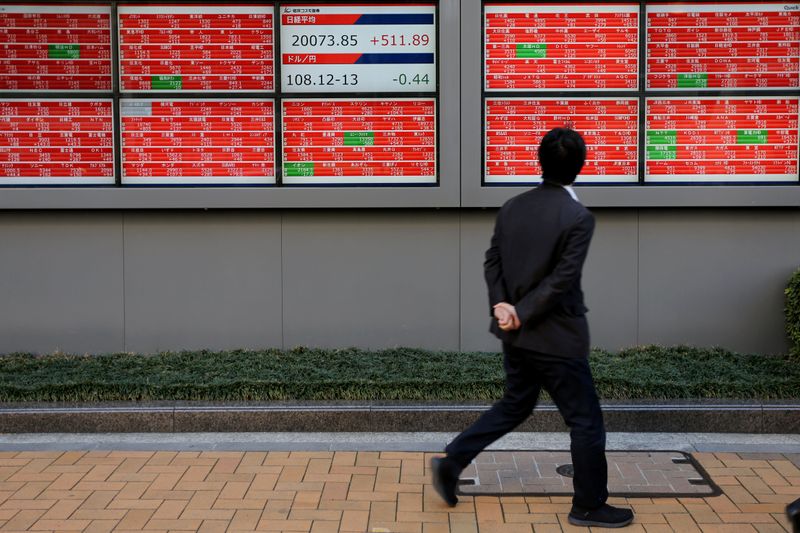By Tom Westbrook
SYDNEY (Reuters) - Bonds dropped and stocks gained on Wednesday, as news of a working COVID-19 vaccine seemed to inoculate investors against worry about surging infections, while the kiwi leapt as traders pared bets on New Zealand imposing negative interest rates.
MSCI's broadest index of Asia-Pacific shares outside Japan (MIAPJ0000PUS) rose 0.4% and Japan's Nikkei (N225) rose 1.8%, although most of the action was switching between stocks as investors sold coronavirus winners to buy discounted losers.
Banks, for example, made additions to Tuesday gains, as did energy and some travel stocks while tech companies fell, even if the pace moderated from Tuesday moves on Wall Street.
Oil futures crept to new two-month highs on a sharp draw-down in supplies and anticipation of better demand in a post-pandemic world.
Equity futures reflected the steadiness at the index level, with S&P 500 futures (ESc1) up 0.2%, European futures (STXEc1) a shade weaker and Britain's FTSE futures (FFIc1) flat.
Currencies were quiet save gentle dollar selling and the soaring kiwi, which climbed nearly 1% to a 19-month high of $0.6903 after the Reserve Bank of New Zealand kept rates on hold, as expected, but sounded less dovish about the outlook.
"A rotation theme remains evident in equity markets," said National Australia Bank strategist Rodrigo Catril in a note.
"Big tech, which has benefited from our virus-driven change in behaviour, is now falling out of favour while small-cap stocks and those that have been most affected by social distancing restrictions have outperformed."
Hong Kong's Hang Seng (HSI) traded either side of flat as gains in financials were balanced by losses in tech names such as Tencent (HK:0700) and Alibaba (HK:9988).
In Tokyo, industrials led the charge as enthusiasm for buying airlines petered out, while Shanghai's tech-heavy indexes slipped slightly. Australian banks (AXFJ) rose while camping gear retailers and gold miners extended losses.
The euro (EUR=) paused at $1.1820 ahead of a speech from European Central Bank president Christine Lagarde at 1300 GMT.
INOCULATE, ROTATE
The equity rotation has come with a huge bond selloff since Pfizer Inc (N:PFE) announced on Monday that its COVID-19 vaccine candidate, developed with BioNTech (O:BNTX), showed a 90% success rate in preventing infection during trials.
The U.S. bond market is shut for Veterans Day but the yield on benchmark 10-year Treasuries (US10YT=RR) posted its highest close since March on Tuesday at 0.9720%, leaving the spread with two-year notes
There is also a rotation of sorts underway in fixed income markets, as bonds in Japan, South Korea, Singapore and Thailand fell while riskier bonds in higher-paying countries like Indonesia held gains.
"Because of the better trade and growth prospects ... I think we're going to see a bit of yield compression between the low yielders and high yielders," said Duncan Tan, rates strategist at DBS in Singapore.
New Zealand bonds crumbled as traders swiftly re-priced a much lower liklihood of negative rates, lifting the 10-year yield (NZ10YT=RR) by 14.5 basis points to 0.898%, the steepest one-day rise since panic selling in March.
"The well managed COVID situation in New Zealand and prospects of a vaccine are heightening expectations that the RBNZ may not ultimately need to be as dovish as it sounds," said Bank of Singapore currency analyst Moh Siong Sim.

Brent crude futures (LCOc1) were last 41 cents firmer at $44.02 a barrel, just below a two-month high made earlier in the session. U.S crude (CLc1) futures rose 42 cents to $41.79 a barrel. Gold